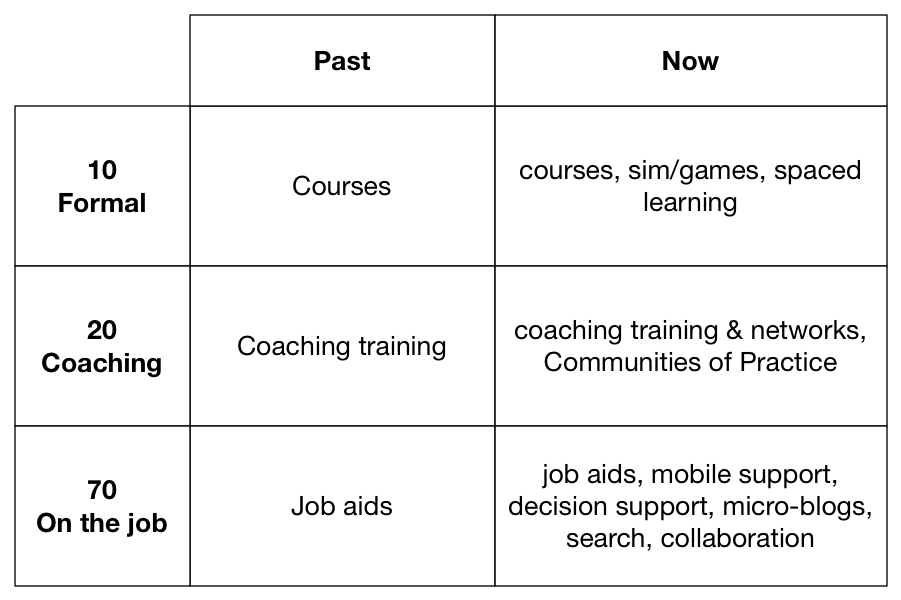At the recent Up To All Of Us event (#utaou), someone asked about the 70:20:10 model. As you might expect, I mentioned that it’s a framework for thinking about supporting people at work, but it also occurred to me that there might be a reason folks have not addressed the 90, because, in the past, there might have been little that they could do. But that’s changed.
In the past, other than courses, there was little at could be done except providing courses on how to coach, and making job aids. The technology wasn’t advanced enough. But that’s changed.
 What has changed are several things. One is the rise of social networking tools: blogs, micro-blogs, wikis, and more. The other is the rise of mobile. Together, we can be supporting the 90 in fairly rich ways.
What has changed are several things. One is the rise of social networking tools: blogs, micro-blogs, wikis, and more. The other is the rise of mobile. Together, we can be supporting the 90 in fairly rich ways.
For the 20, coaching and mentoring, we can start delivering that wherever needed, via mobile. Learners can ask for, or even be provided, support more closely tied to their performance situations regardless of location. We can also have a richer suite of coaching and mentoring happening through Communities of Practice, where anyone can be a coach or mentor, and be developed in those roles, too. Learner activity can be tracked, as well, leaving traces for later review.
For the 70, we can first of all start providing rich job aids wherever and whenever, including a suite of troubleshooting information and even interactive wizards. We also can have help on tap freed of barriers of time and distance. We can look up information as well, if our portals are well-designed. And we can find people to help, whether information or collaboration.
The point is that we no longer have limits in the support we can provide, so we should stop having limits in the help we *do* provide.
Yes, other reasons could still also be that folks in the L&D unit know how to do courses, so that’s their hammer making everything look like a nail, or they don’t see it as their responsibility (to which I respond “Who else? Are you going to leave it to IT? Operations?”). That *has* to change. We can, and should, do more. Are you?
I read an interesting paper the other night by Dr. Wim Westera (http://dspace.ou.nl/handle/1820/2112). Reading your thoughts reminded me of something: the importance of a guide (or mentor or coach or instructional designer). Back in the day, as I understand it, learning how to make things involved apprenticeships. I think this is the original social learning: learning under someone’s guidance. In an apprenticeship context the 70:20:10 is flipped: the coach (expert, practitioner) provides the bulk of the learning experience with job aids or courses being (initially) minimal.
What I took away from Dr. Westera’s article is that today the Internet (with all its media, social connections and other resources) is the 70; the Internet, I think, is a collection of job-aids. The coach (teacher, mentor, instructional designer) helps the student filter what is important within their context. Over time, as the student gains mastery, I can see the ratios shifting to what you describe: 70:20:10 (OJT, coaching, formal).
Anyway, that’s how it makes sense to me.